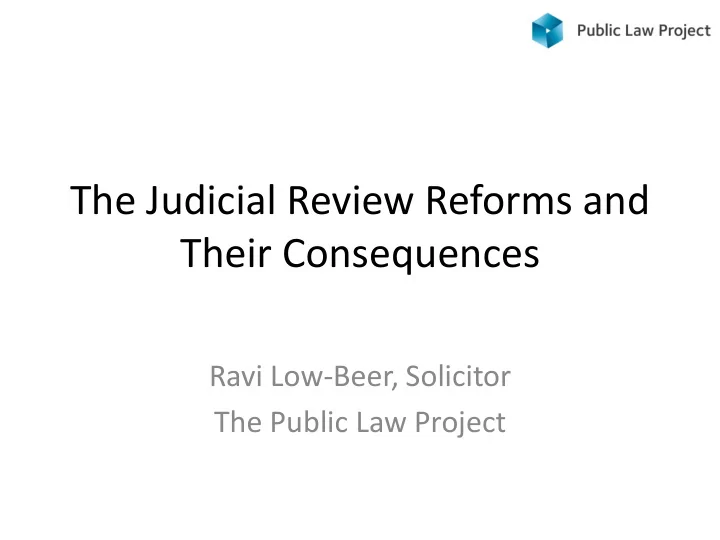

The Judicial Review Reforms and Their Consequences Ravi Low-Beer, Solicitor The Public Law Project
From this… “In our view, proceedings where the litigant is seeking to hold the state to account by judicial review are important, because these cases are the means by which individual citizens can seek to check the exercise of executive power by appeal to the judiciary. These proceedings therefore represent a crucial way of ensuring that state power is exercised responsibly.” Lord Chancellor Ken Clarke (November 2010)
To this… “The professional campaigners of Britain are growing in number, taking over charities, dominating BBC programmes and swarming around Westminster. Often, they are better paid than the people they lobby as they articulate a Left-wing vision which is neither affordable nor deliverable”. (Chris Grayling writing in the Daily Mail, 6 September 2013 under the headline: “The judicial review system is not a promotional tool for countless Left- wing campaigners”)
The proposals now before Parliament (1) The test to be applied to claims where it is argued by the defendant that the court should refuse relief because the outcome would be the same if the decision were quashed by the court and then retaken by the defendant. (2) A series of measures purporting to rebalance the financial incentives in judicial review to make them potentially more financially risky for claimants. Following imposition of restrictions on legal aid for judicial review claimants’ lawyers
The outcome would be the same if the decision were quashed by the court and then retaken by the defendant Current position – test is certainty Proposal – test should be “highly likely” Consequences – (1) public bodies will escape responsibility for unlawful decisions, (2) it will decrease the quality of our public administration, and (3) it will add to the cost of judicial review cases at the permission stage.
The financial incentives proposals - interventions The current position – costs at court’s discretion, but usually permission to intervene granted on basis that no costs are sought or awarded against intervener The proposal - the court must order that an intervener pays other parties' costs arising from the intervention (subject to a discretion to depart from this rule in exceptional circumstances, defined by Government) Consequences – fewer interventions by NGOs that cannot afford the costs risk
Financial incentive proposals - Capping of Costs / Protective Costs Orders Current position - A ‘PCO’ is an order that, at the outset of proceedings, extinguishes or limits a party's liability for their opponents’ costs, in the event that the claim is lost. The proposals – include to prevent PCOs before permission is granted in a judicial review. To empower the Minister for Justice to define the ‘public interest’ test and to alter the criteria which determine whether a costs capping order should be made The consequences – (1) the prohibition on per-permission PCOs will restrict number of applications (2) powers given to the Minister are unprecedented incursions into the independence of the court
The residence test challenge A successful battle…
Recommend
More recommend